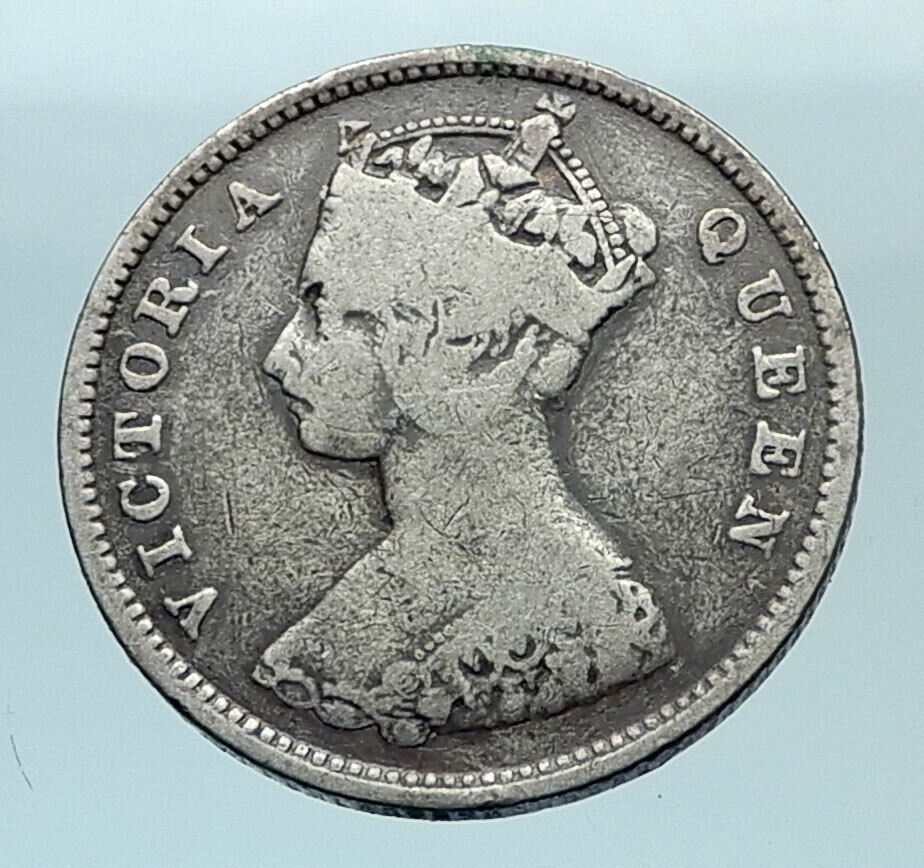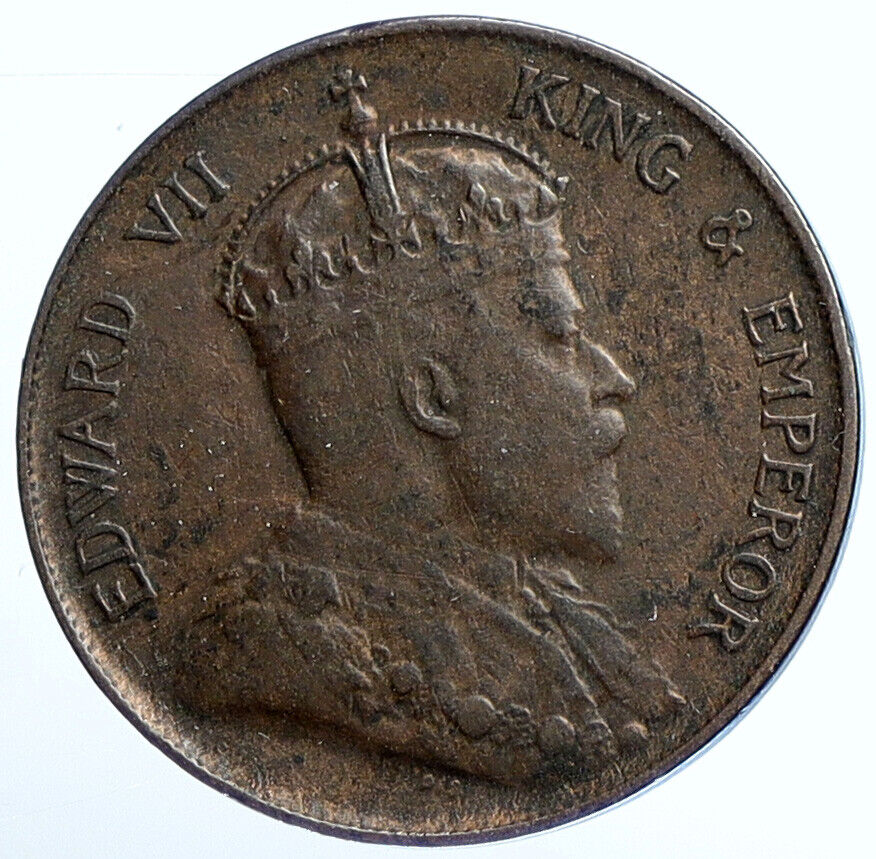|
Hong Kong as British Colony under Edward VII – King of the United Kingdom and the British Dominions
1905 Bronze 1 Cent 27.5mm (7.44 grams)
Reference: KM# 11, Schön# 1 (1902-05) | Engraver: George William de Saulles
EDWARD VII KING & EMPEROR, Crowned bust of King Edward VII facing right.
.HONG-KONG. 香 仙一 港 ONE CENT 190, Chinese value within beaded circle, date lower right with the mintmark above the line between “HONG” and “KONG”
You are bidding on the exact item pictured, provided with a Certificate of Authenticity and Lifetime Guarantee of Authenticity.
 Edward VII (Albert Edward; 9 November 1841 – 6 May 1910) was King of the United Kingdom and the British Dominions and Emperor of India from 22 January 1901 until his death. Edward VII (Albert Edward; 9 November 1841 – 6 May 1910) was King of the United Kingdom and the British Dominions and Emperor of India from 22 January 1901 until his death.
The eldest son of Queen Victoria and Prince Albert of Saxe-Coburg and Gotha , Edward was related to royalty throughout Europe. Before his accession to the throne, he served as heir apparent and held the title of Prince of Wales for longer than any of his predecessors. During the long reign of his mother, he was largely excluded from political power and came to personify the fashionable, leisured elite. He travelled throughout Britain performing ceremonial public duties and represented Britain on visits abroad. His tours of North America in 1860 and the Indian subcontinent in 1875 were popular successes, but his reputation as a playboy prince soured his relationship with his mother.
As king, Edward played a role in the modernisation of the British Home Fleet and the reorganisation of the British Army after the Second Boer War . He re-instituted traditional ceremonies as public displays and broadened the range of people with whom royalty socialised. He fostered good relations between Britain and other European countries, especially France , for which he was popularly called “Peacemaker”, but his relationship with his nephew, Kaiser Wilhelm II , was poor. The Edwardian era , which covered Edward’s reign and was named after him, coincided with the start of a new century and heralded significant changes in technology and society, including steam turbine propulsion and the rise of socialism . He died in 1910 in the midst of a constitutional crisis that was resolved the following year by the Parliament Act 1911 , which restricted the power of the unelected House of Lords .
  Hong Kong (literally: “Fragrant Harbour”), officially Hong Kong Special Administrative Region of the People’s Republic of China, is an autonomous territory on the southern coast of China at the Pearl River Estuary and the South China Sea. Hong Kong is known for its skyline and deep natural harbour. It has a land area of 1104 km2 and shares its northern border with Guangdong Province of Mainland China. With around 7.2 million inhabitants of various nationalities, Hong Kong is one of the world’s most densely populated metropolises. Hong Kong (literally: “Fragrant Harbour”), officially Hong Kong Special Administrative Region of the People’s Republic of China, is an autonomous territory on the southern coast of China at the Pearl River Estuary and the South China Sea. Hong Kong is known for its skyline and deep natural harbour. It has a land area of 1104 km2 and shares its northern border with Guangdong Province of Mainland China. With around 7.2 million inhabitants of various nationalities, Hong Kong is one of the world’s most densely populated metropolises.
After the First Opium War (1839-42), Hong Kong became a British colony with the perpetual cession of Hong Kong Island, followed by Kowloon Peninsula in 1860 and a 99-year lease of the New Territories from 1898. Hong Kong remained under continuous British control for about a century until the Second World War, when Japan occupied the colony from December 1941 to August 1945. British control resumed in 1945 following the Surrender of Japan. In the 1980s, negotiations between the United Kingdom and China resulted in the 1984 Sino-British Joint Declaration, which provided for the transfer of sovereignty of Hong Kong on 30 June 1997. The territory became a special administrative region of China with a high degree of autonomy on 1 July 1997 under the principle of one country, two systems. Disputes over the perceived misapplication of this principle have contributed to popular protests, including the 2014 Umbrella Revolution.
In the late 1970s, Hong Kong became a major entrepôt in Asia-Pacific. The territory has developed into a major global trade hub and financial centre. The 44th-largest economy in the world, Hong Kong ranks top 10 in GDP (PPP) per capita, but also has the most severe income inequality among advanced economies. Hong Kong is one of the three most important financial centres alongside New York and London, and the world’s number one tourist destination city. The territory has been named the freest market economy. The service economy, characterised by free trade and low taxation, has been regarded as one of the world’s most laissez-faire economic policies, and the currency, the Hong Kong dollar, is the 13th most traded currency in the world.
The Hong Kong Basic Law is its quasi-constitution which empowers the region to develop relations and make agreements directly with foreign states and regions, as well as international organizations, in a broad range of appropriate fields. It is an independent member of APEC, the IMF, WTO, FIFA and International Olympic Committee among others.
Limited land created a dense infrastructure and the territory became a centre of modern architecture, and has a larger number of highrises than any other city in the world. Hong Kong has a highly developed public transportation network covering 90 per cent of the population, the highest in the world, and relies on mass transit by road or rail. Air pollution remains a serious problem. Loose emissions standards have resulted in a high level of atmospheric particulates. Nevertheless, residents of Hong Kong (sometimes referred to as Hongkongers) enjoy one of the longest life expectancies in the world.
|






 Edward VII (Albert Edward; 9 November 1841 – 6 May 1910) was King of the United Kingdom and the British Dominions and Emperor of India from 22 January 1901 until his death.
Edward VII (Albert Edward; 9 November 1841 – 6 May 1910) was King of the United Kingdom and the British Dominions and Emperor of India from 22 January 1901 until his death.
 Hong Kong (literally: “Fragrant Harbour”), officially Hong Kong Special Administrative Region of the People’s Republic of China, is an autonomous territory on the southern coast of China at the Pearl River Estuary and the South China Sea. Hong Kong is known for its skyline and deep natural harbour. It has a land area of 1104 km2 and shares its northern border with Guangdong Province of Mainland China. With around 7.2 million inhabitants of various nationalities, Hong Kong is one of the world’s most densely populated metropolises.
Hong Kong (literally: “Fragrant Harbour”), officially Hong Kong Special Administrative Region of the People’s Republic of China, is an autonomous territory on the southern coast of China at the Pearl River Estuary and the South China Sea. Hong Kong is known for its skyline and deep natural harbour. It has a land area of 1104 km2 and shares its northern border with Guangdong Province of Mainland China. With around 7.2 million inhabitants of various nationalities, Hong Kong is one of the world’s most densely populated metropolises.




